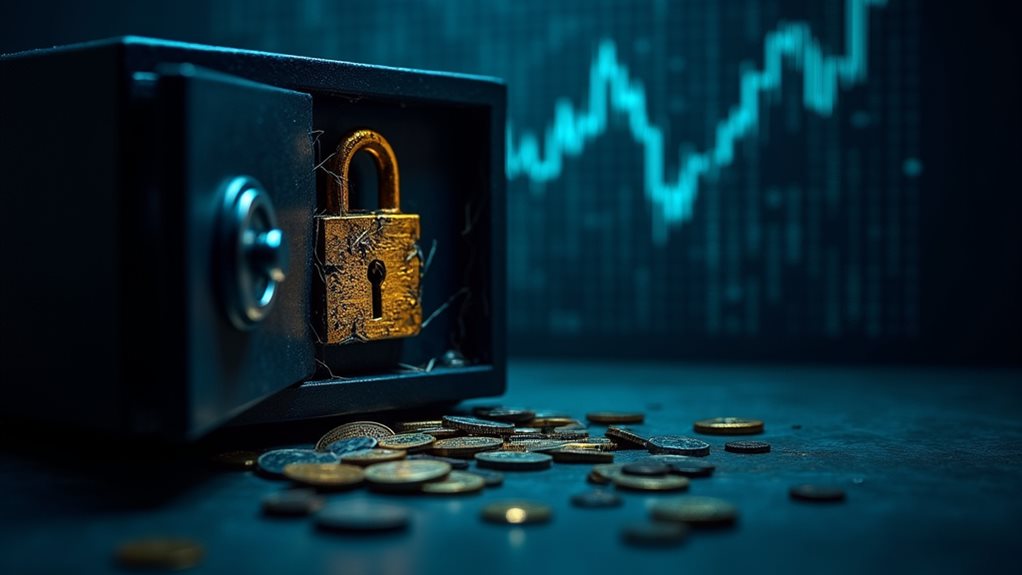Keeping your crypto safe in 2025 isn't rocket science. Secure those private keys with hardware wallets or encrypted storage—never cloud services, seriously. Use multi-factor authentication with authenticator apps, not SMS (SIM-swapping is real, folks). Ditch public Wi-Fi for transactions. Choose reputable exchanges with insurance options. Implement strong passwords via a password manager. Consider multi-signature wallets for substantial holdings. Stay updated on regulations, or watch your assets vanish overnight. Deeper protection strategies await below.
7 Steps to Keep Your Crypto Safe in 2025
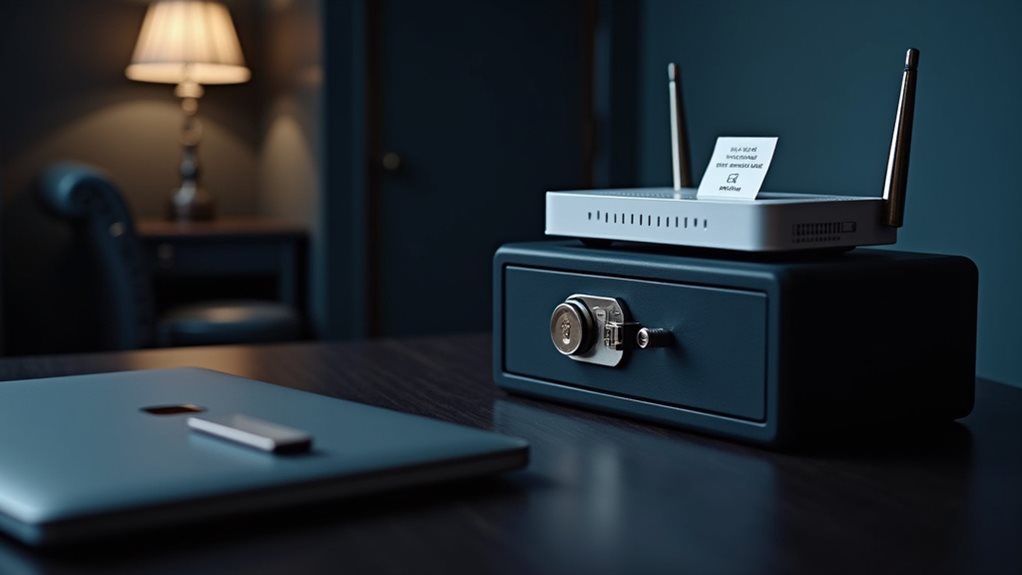
While crypto thieves get smarter every day, your defense strategy needs to stay ahead of the curve. It's not rocket science, folks.
Start with the basics: use a password manager like LastPass. Generate complex passwords that aren't your dog's name plus your birth year. Shocking concept, right?
Password security isn't rocket science—it's simply refusing to gift your crypto to hackers on a silver platter.
Two-factor authentication isn't optional anymore. It's mandatory. Period.
Consider crypto insurance for large holdings—it's worth every penny when things go sideways. And they will. Trust me.
Hardware wallets like Ledger or Trezor aren't just fancy gadgets; they're your lifeline. Cold storage options provide the highest level of security for your digital assets.
Keep wallet recovery phrases offline—not in that notes app you think nobody can access. Phishing attacks frequently trick users into revealing their private keys by impersonating legitimate crypto services.
Public Wi-Fi for crypto transactions? Absolutely not.
VPNs aren't perfect, but they're better than nothing.
Always double-check wallet addresses before confirming any transaction to prevent sending your funds to fraudulent destinations.
Secure Your Private Keys and Seed Phrases
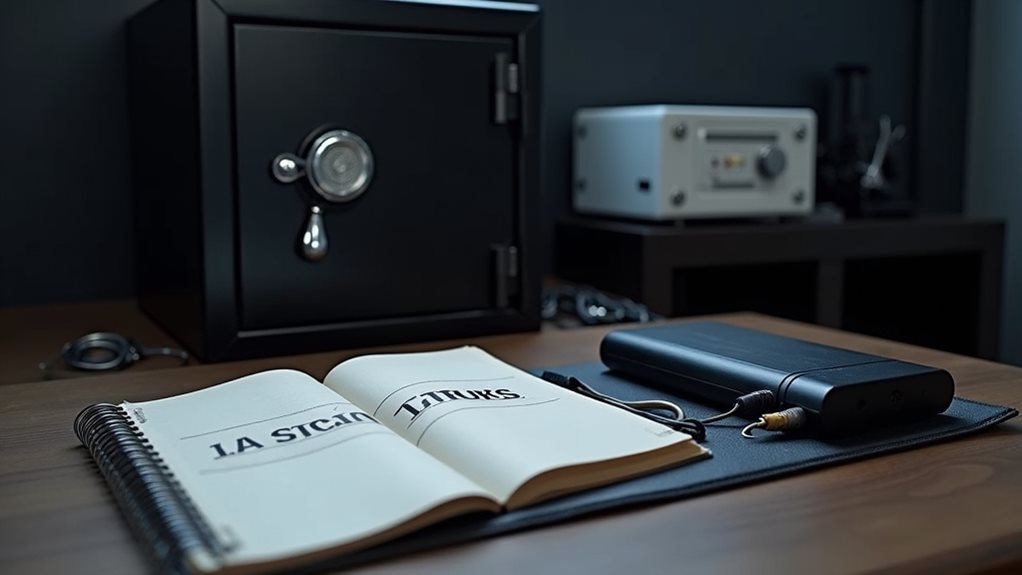
Let's talk about the heart of your crypto security—your private keys and seed phrases. They're basically your financial soul. Lose them, and you're toast.
First, generate keys using a proper CSPRNG—not some wonky random number thing you cooked up. Length matters here (no jokes, please). Hardware wallets provide the ultimate security for serious investors.
For secure storage, consider HSMs or encrypted files with passphrases that would make a hacker cry.
Don't be stupid with seed phrases. Metal plates or quality paper—offline, obviously. Cloud storage? Might as well post them on Twitter. Seriously.
Key rotation isn't just corporate jargon—regularly changing keys limits your exposure window. The principles of data integrity ensure that properly encrypted information cannot be tampered with without detection.
And those multi-sig wallets? Not just fancy tech—they're your safety net when things go sideways.
Hackers are circling like sharks. Your defenses better be shark-proof.
With the Q2 2024 surge in crypto hacks totaling $570 million stolen, securing your private keys has never been more critical.
Choose the Right Wallet for Your Needs

How exactly do you pick a crypto wallet when there are more options than streaming services? Wallet comparisons matter. A lot.
Start with the basics: hot wallets for traders (quick but less secure), cold wallets for hodlers (safer but clunkier). Your needs dictate your choice. Period. Private key security ensures only you can access and transfer your cryptocurrency assets.
User experiences vary wildly—beginners should check out Coinbase Wallet or Exodus for their friendly interfaces. Trust Wallet's another solid bet.
Got serious crypto? Hardware wallets like Ledger Nano S Plus aren't cheap, but they're worth it.
Modern wallets are evolving fast. MPC technology, DeFi integration, NFT storage—2025's options make 2020's look prehistoric.
Remember: multi-chain wallets handle diverse assets. Non-custodial means you control your keys. MetaMask stands out for Ethereum users and provides exceptional support for DeFi applications and NFT enthusiasts.
SafePal offers an excellent hybrid solution that combines the convenience of hot wallets with the security advantages of cold storage.
The best wallet? The one that matches YOUR security needs.
Implement Multi-Factor Authentication
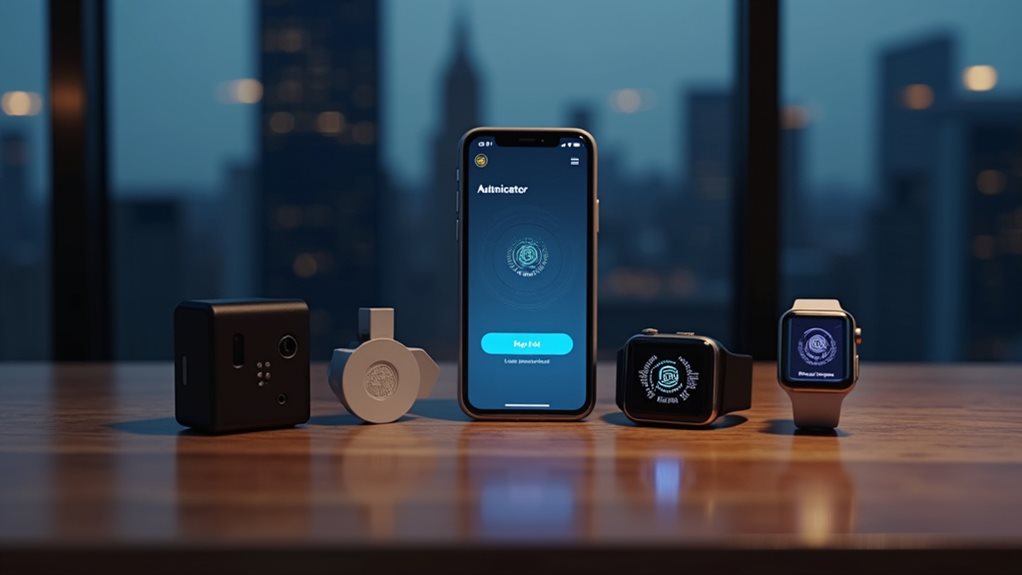
Securing a great wallet won't matter if someone can guess your password. That's where multi-factor authentication comes in—your digital bodyguard in 2025's crypto wilderness.
Various MFA methods exist, but they're not all created equal. SMS codes? Too vulnerable to SIM-swapping. Authenticator apps like Google Authenticator? Much better. Hardware tokens? Even better.
User education remains essential. Know this: a shocking number of crypto thefts happen because people skip MFA altogether. Don't be that person. Smart contract vulnerabilities continue to expose millions in assets to sophisticated hackers in 2025.
The crypto landscape is evolving fast. Biometrics, AI-driven security systems, and passwordless authentication are gaining traction. These aren't just fancy features—they're necessary protection. Authenticator apps provide significantly more security than SMS verification codes when protecting your cryptocurrency accounts.
Remember: your crypto security is only as strong as its weakest link. Strong authentication measures effectively verify your identity and help prevent unauthorized access to your valuable digital assets. MFA isn't optional anymore. It's survival.
Protect Your Network Connections
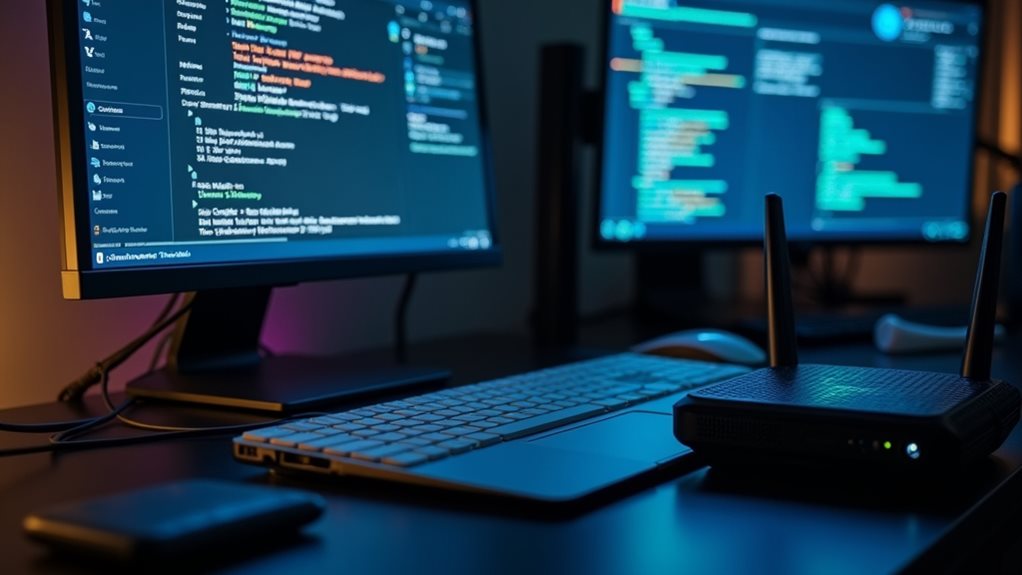
Your crypto empire won't survive long if your network leaks like a sieve.
Hackers love nothing more than snatching coins through flimsy connections.
VPN advantages can't be overstated—they encrypt your traffic and mask your digital footprint.
Use one. Always.
Firewall importance? Non-negotiable.
They're your digital bouncers, keeping the riffraff out while you manage your portfolio.
Public Wi-Fi is crypto suicide—avoid it like that sketchy ICO your cousin recommended.
Your router deserves attention too.
Update firmware regularly, use WPA3 encryption, and for heaven's sake, change that default password.
"Password123" isn't clever, it's an invitation.
Remember HTTPS when browsing crypto sites.
That little lock icon? It's the difference between security and some teenager in a basement owning your Bitcoin.
Implementing Zero Trust Architecture has proven crucial for protecting blockchain systems as traditional centralized security models become increasingly vulnerable to sophisticated attacks.
Consider utilizing cold storage options for your valuable cryptocurrency assets to keep them securely offline and away from potential online threats.
With multi-signature wallets offering limited protection, it's crucial to layer multiple security measures for maximum defense.
Select Reputable Exchanges and Platforms
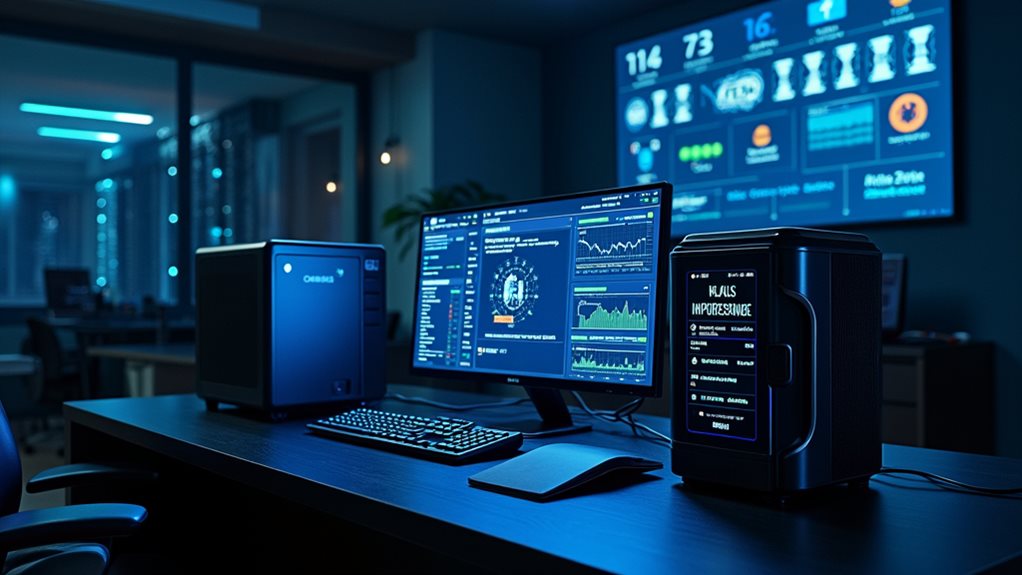
Now that your network's locked down, let's talk about where you actually store your crypto.
Choosing the right exchange isn't just smart—it's essential. For newcomers, beginner exchanges like Coinbase offer user-friendly interfaces and fiat integration. No rocket science needed. Both Coinbase and Binance.US provide staking opportunities for passive income generation.
But security matters more than convenience.
Want real protection? Look at Gemini's insured custody and cold storage systems. They're New York regulated—which actually means something.
Advanced trading? Kraken's your bet. Deep liquidity and institutional-grade tools without the ridiculous fees. Binance.US offers competitive fees starting at 0.00% while providing extensive crypto offerings tailored for U.S. regulatory compliance.
Privacy matters? TradeOgre and decentralized platforms like Uniswap operate without KYC. For additional privacy options, exchanges like MEXC allow withdrawal limits of up to 5 BTC per day without identity verification.
Bottom line: cheap isn't always safe, and user-friendly isn't always secure. The exchange you choose might be the difference between keeping your crypto and losing it all. Simple as that.
Stay Updated on Regulatory Compliance

While locking down your wallet matters, regulatory changes can wipe out your holdings overnight. The crypto landscape is shifting dramatically in 2025, with the SEC, CFTC, and FinCEN all playing different roles in how your assets are governed.
Trump's executive orders have shaken things up. New task forces. Clearer frameworks. It's a lot to track. The SEC's Crypto Task Force, chaired by Hester Peirce, is developing clear guidelines for determining which crypto assets qualify as securities. Your responsibility? Keep up with these regulatory updates or face the consequences.
Compliance strategies aren't optional anymore. KYC, AML requirements—they're real, and they're strict. Different states have different rules. New York's especially tough. Professional compliance support services can help navigate the complex regulatory requirements across multiple states. The EU's MiCA framework has set a global precedent for cryptocurrency regulation and compliance standards.
KYC and AML aren't just buzzwords—they're mandatory gatekeepers in crypto's shifting landscape. Ignore state-specific rules at your peril.
The smart money watches for sandbox initiatives and cross-border developments. Stablecoins are getting special attention from regulators.
Remember: What's legal today mightn't be tomorrow. Stay informed.
Frequently Asked Questions
How Do I Recover Crypto After a Phishing Attack?
After a phishing attack, you'll need to report immediately to authorities, track funds using blockchain explorers, document evidence, consult legal experts, and improve your security measures. Phishing prevention and recovery methods require swift action.
Can Quantum Computing Threaten My Cryptocurrency Holdings?
Yes, quantum threats could eventually break current cryptocurrency encryption. However, you don't need immediate concern as the industry is developing quantum-resistant encryption advancements. Stay informed and upgrade your wallet security when new protections become available.
Should I Use Different Wallets for Trading and Long-Term Storage?
Yes, you should use different wallets. Keep small amounts in hot trading wallets for frequent transactions, while securing larger holdings in cold storage wallets for long-term safety and reduced exposure to online threats.
Are Decentralized Exchanges Safer Than Centralized Platforms?
Decentralized exchanges offer better security by letting you control your keys, but centralized platforms often have stronger security features. Your choice depends on your risk tolerance and desired user experience.
How Can I Secure Crypto in My Estate Planning?
You'll need crypto inheritance strategies like digital asset wills and trust structures. Document your private keys, appoint a digital executor, consider multi-signature wallets, and leverage lifetime gifting to reduce tax burdens for your heirs.




